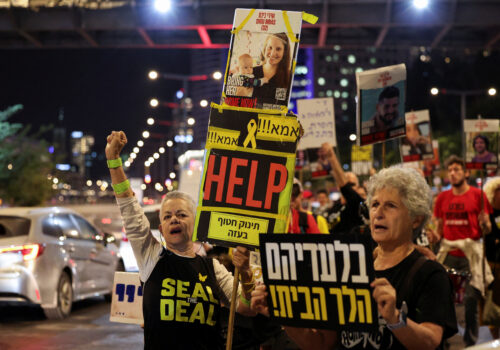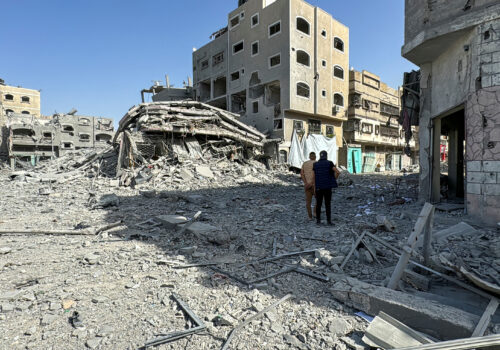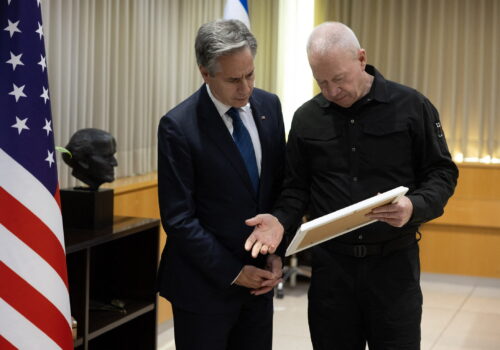Egypt’s new ceasefire proposal is too little, too late
As Egypt continues to suffer the ramifications of the Israel-Hamas war that has dragged on for over a year on its northeastern border, President Abdel Fattah el-Sisi has proposed a new two-day ceasefire between Israel and Hamas that Cairo hopes would ultimately lead to a broader, permanent truce.
Announcing the ceasefire initiative during a press conference with his Algerian counterpart Abdelmadjid Tebboune on October 27, Sisi said the proposed truce would see the release of four hostages held by Hamas in the Gaza Strip in exchange for some Palestinian prisoners held in Israeli jails. He also said that the temporary truce would allow much-needed humanitarian aid to be delivered to the Gaza Strip.
The announcement marked the first time since the war began on October 8, 2023, that the Egyptian president had publicly proposed a ceasefire plan. Egypt has—alongside Qatar and the United States—been a key mediator between Israel and Hamas, but all mediation efforts have so far failed to break the impasse in talks. Sisi said his proposed plan was meant to “move the situation forward,” adding that negotiations between Israel and Hamas for a permanent ceasefire would resume once the truce was in place.
SIGN UP FOR THIS WEEK IN THE MIDEAST NEWSLETTER
Hours after Sisi declared his ceasefire plan, Israeli Prime Minister Benjamin Netanyahu dismissed the Egyptian proposal as “non-existent.” During a meeting with members of his Likud Party on October 28, Netanyahu speculated that Hamas may accept the proposed truce deal because it would buy time for the militant group to get out of the tunnels and offer Hamas some respite. He added that if the Egyptian plan to free the four Israeli hostages were real, he would have accepted it right away.
Samir Farag, a senior strategist who sits on Egypt’s Security and Advisory Board, told me that Netanyahu rejected the Egyptian proposal because it advocates for a short-lived truce that would see only four of the remaining hostages released.
“The Israeli prime minister believes he has achieved major gains by annihilating senior Hamas and Hezbollah leaders in recent days; the only truce deal he would accept at this point is one that would see all of the remaining hostages released,” Farag explained. “Pressure has been piling on Netanyahu internally; the patience of the Israeli public and, in particular, the families of the hostages held by Hamas, is wearing thin at this stage.”
However, Netanyahu’s rejection of the Egyptian deal also comes at a time when relations between Egypt and Israel are on the rocks. Tensions between Cairo and Jerusalem spiked in 2023 after Israel seized control of the strategic Philadelphi Corridor running along the border with Gaza on the Egyptian side. The fourteen kilometer-long corridor was initially created as a buffer zone between Gaza and Egypt to prevent the smuggling of goods and weapons into Gaza. The corridor was under Israeli control under the 1979 peace treaty signed by Egypt and Israel. In 2005, when Israel unilaterally disengaged from Gaza, a deal was struck between the two countries, allowing Egypt to secure the thin strip of land on its side of the border. Under the 2005 agreement known as the Philadelphi Accord, Egypt was authorized to deploy a small contingent of 750 border guards along its side of the buffer zone.
The Israeli takeover of the Philadelphi Corridor in May enraged the Egyptian leadership, which had earlier warned that the corridor was “a red line” Cairo fears that Israeli assaults on Rafah in the south of the Gaza Strip may force Palestinian refugees to cross into the Sinai Peninsula to escape the violence. Salah Gomaa, deputy editor-in-chief of the state-owned Al-Sharq al-Awsat radio station told me he suspects the real motive behind Israel’s reoccupation of the Philadelphi Corridor is to allow a mass influx of Palestinian refugees into Egypt despite repeated warnings from Sisi that he categorically rejects the forced displacement of Palestinians to Egypt.
Sisi’s latest ceasefire plan isn’t Cairo’s first attempt to end the war, which has claimed more than 43,000 lives in the Gaza Strip, according to the latest toll released by the Palestinian Health Ministry. In December 2023, Hamas rejected an Egyptian proposal that would have seen the Islamist group cede power in the Gaza Strip in return for a permanent ceasefire. On May 6, another Egyptian ceasefire plan suggesting a phased truce that would gradually culminate into a permanent ceasefire and which had been endorsed by the Israeli side, again fell through. This happened after Qatari and American mediators discovered that Egyptian security officials had purportedly changed the terms of the deal agreed to by Israel before submitting the proposal to Hamas.
Despite the revelation causing embarrassment for the Egyptian leadership, Cairo appears adamant about continuing its mediation efforts to end the violence. For one, Egypt would like to regain its traditional role as a key mediator between Israel and Hamas. Secondly, Israel has widened the focus of its war to include Lebanon and Iran as new fronts—an escalation that threatens the stability and security of the entire region. More importantly, the war has also taken a heavy toll on Egypt’s already troubled economy.
Suez Canal revenues have dropped by 70 percent as a result of recurring Houthi attacks on commercial shipping in the Red Sea. A further escalation of the conflict may further impact tourism, another major source of income for the country. Additionally, there’s the looming risk of a massive influx of Palestinian refugees—a scenario that would pile additional pressure on the country’s already overstretched resources, causing water and electricity shortages, overcrowding in services such as health and education, and a further surge in inflation. Such a situation could very well trigger a new wave of unrest.
It could also be that the Egyptian leadership sees a window of opportunity right now to end the war, given the fact that Israel has accomplished its goals of wiping out the senior leaders of Hamas and Hezbollah in recent weeks. Moreover, internal pressure is rising in Israel to end the war; more than 3,000 Israelis have in recent days signed an open letter calling for international help to pressure Israel to end the war. Signatories blame the “lack of sanctions from other countries” and “the persecution of Palestinian citizens of Israel without real cost” for the continuation of the war. In early September, hundreds of thousands of Israelis staged rallies in Tel Aviv and other Israeli cities to protest the Netanyahu government’s handling of the war. This came after the bodies of six hostages were reportedly found in underground tunnels in Rafah, south of the Gaza Strip. An autopsy revealed that the hostages whom Hamas seized during the October 7, 2023 attacks, had been shot multiple times at close range by their captors a couple of days earlier
Hind al-Dawi, a journalist with the semi-official Al Ahram and researcher on regional and international affairs links the Egyptian proposal to the upcoming US elections.
“Israel has suffered heavy losses in south Lebanon in recent days and its recent assault on military sites in Iran has raised fears of a full-scale conflict in the region,” she said in an October 28 interview on the Al-Mayadeen satellite channel. She added that with the US elections set to be held on November 5, Democrats fear that a wider conflict in the Middle East could sway voters in favor of Donald Trump, the Republican presidential candidate.
“Cairo put forward the ceasefire proposal now because the Egyptian leadership believes the proposed deal will likely win the backing of the current US administration,” she noted.
However, with the US election results expected to be announced a few days after polling starts on November 5, time has already run out. The proposed Egyptian plan is too little, too late. Hopes of averting a full-fledged regional conflict are quickly dissipating. The next US administration must either use its leverage to enforce a ceasefire or work alongside Qatari and Egyptian mediators to craft a new deal that is acceptable to both Israel and Hamas.
Shahira Amin is a nonresident senior fellow at the Atlantic Council’s Scowcroft Middle East Security Initiative and an independent journalist based in Cairo. A former contributor to CNN’s Inside Africa, Amin has been covering the development in post-revolution Egypt for several outlets, including Index on Censorship and Al-Monitor. Follow her on X: @sherryamin13.
Further reading
Wed, Oct 30, 2024
Inside Israeli politics and public opinion with a pollster
MENASource By Stefanie Hausheer Ali
The Tel Aviv-based public opinion researcher and political advisor was interviewed to discuss how Israelis view Prime Minister Benjamin Netanyahu, the ongoing conflict, and the future.
Tue, Oct 29, 2024
Update: Israel claims it is no longer occupying the Gaza Strip. What does international law say?
MENASource By Celeste Kmiotek
On July 19, the International Court of Justice released an Advisory Opinion on the Legal Consequences Arising from the Policies and Practices of Israel in the Occupied Territory, Including East Jerusalem.
Tue, Oct 29, 2024
Gaza is a war without end. American interests must be reassessed.
MENASource By Frederic C. Hof
Israel’s appraisal of what it faces and its actions concerning civilians make it difficult for Washington to uphold a key strategic partnership without suffering severe diplomatic reversals in the region and around the world.
Image: Handout photo shows Secretary of State Antony J. Blinken meets with Egyptian President Abdel Fattah El-Sisi in Al Alamein, Egypt on Tuesday, August 20, 2024. Blinken sought during a whirlwind trip to the Middle East to inject urgency into efforts to broker a Gaza ceasefire deal, but departed the region on Tuesday with an agreement between Israel and Hamas still elusive. Blinken and mediators from Egypt and Qatar have pinned their hopes on a U.S. “bridging proposal” aimed at narrowing the gaps between the two sides in the 10-month-old war, after negotiations last week paused without a breakthrough. Official State Department photo by Chuck Kennedy via ABACAPRESS.COM



